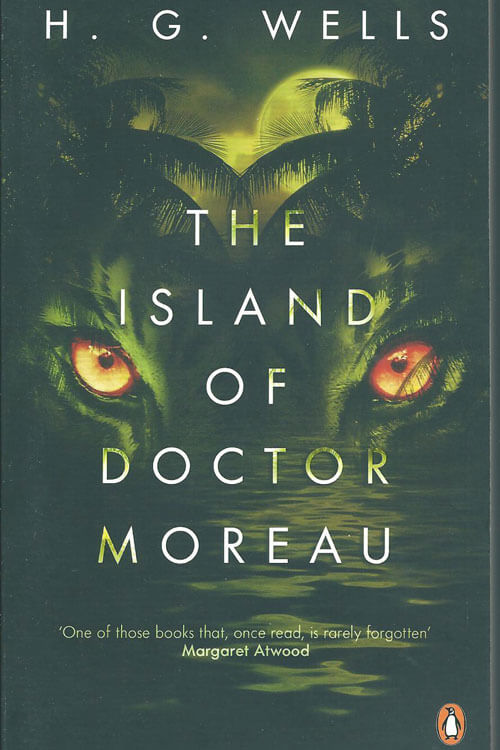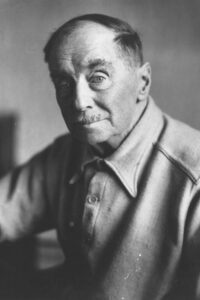
The Island of Doctor Moreau
It seemed to me that this man had come out of Immensity merely to save my life. Tomorrow, he would drop over the side and vanish again out of my existence. Even had it been under commonplace circumstances, it would have made me a trifle thoughtful, but in the first place, it was the singularity of an educated man living on this unknown little island, coupled with the extraordinary nature of his luggage.
I found myself repeating the captain’s question, What did he want with the beasts? Why, too, had he pretended they were not his when I had remarked about them at first? Then, again, in his personal attendant there was a bizarre quality which had impressed me profoundly.
These circumstances threw a haze of mystery round the man.
Read or download Book
H. G. Wells
Herbert George Wells (21 September 1866 – 13 August 1946) was an English writer. Prolific in many genres, he wrote more than fifty novels and dozens of short stories. His non-fiction output included works of social commentary, politics, history, popular science, satire, biography, and autobiography. Wells’ science fiction novels are so well regarded that he has been called the “father of science fiction”.
In addition to his fame as a writer, he was prominent in his lifetime as a forward-looking, even prophetic social critic who devoted his literary talents to the development of a progressive vision on a global scale. As a futurist, he wrote several utopian works and foresaw the advent of aircraft, tanks, space travel, nuclear weapons, satellite television and something resembling the World Wide Web. His science fiction imagined time travel, alien invasion, invisibility, and biological engineering before these subjects became common in the genre. Brian Aldiss referred to Wells as the “Shakespeare of science fiction”, while Charles Fort called him a “wild talent”. He pioneered modern miniature wargaming, such as with his Little Wars rules in 1913.
Wells rendered his works convincing by instilling commonplace detail alongside a single extraordinary assumption per work – dubbed “Wells’s law” – leading Joseph Conrad to hail him in 1898 with “O Realist of the Fantastic!”. His most notable science fiction works include The Time Machine (1895), which was his first novel, The Island of Doctor Moreau (1896), The Invisible Man (1897), The War of the Worlds (1898), the military science fiction The War in the Air (1907), and the dystopian When the Sleeper Wakes (1910). Novels of social realism, such as Kipps (1905) and The History of Mr Polly (1910), which describe lower-middle-class English life, led to the suggestion that he was a worthy successor to Charles Dickens, 99. Still, Wells described a range of social strata and attempted, in Tono-Bungay (1909), to diagnose English society as a whole. Wells was nominated for the Nobel Prize in Literature four times.
Wells’s earliest specialised training was in biology, and his thinking on ethical matters occurred in a Darwinian context. He was also an outspoken socialist from a young age, often (but not always, as at the beginning of the First World War) sympathising with pacifist views. In his later years, he wrote less fiction and more works expounding his political and social opinions, sometimes giving his profession as a journalist. Wells was a diabetic and co-founded the charity The Diabetic Association (Diabetes UK) in 1934.
Life
Early life
Hobert George Wells was born at Atlas House, 162 High Street in Bromley, Kent,[ on 21 September 1866. Called “Bertie” by his family, he was the fourth and last child of Joseph Wells, a former domestic gardener, and at the time a shopkeeper and professional cricketer and Sarah Neal, a former domestic servant. An inheritance had allowed the family to acquire a shop where they sold china and sporting goods, although it failed to prosper partly because the stock was old and worn out, and the location was poor. Joseph Wells managed to earn a meagre income, but little of it came from the shop, and he received an unsteady amount of money from playing professional cricket for the Kent County team.
Writer
Some of his early novels, called “scientific romances”, invented several themes now classic in science fiction in such works as The Time Machine, The Island of Doctor Moreau, The Invisible Man, The War of the Worlds, When the Sleeper Wakes, and The First Men in the Moon. He also wrote realistic novels that received critical acclaim, including Kipps and a critique of English culture during the Edwardian period, Tono-Bungay. Wells also wrote dozens of short stories and novellas, including “The Flowering of the Strange Orchid”, which helped bring the full impact of Darwin’s revolutionary botanical ideas to a broader public and was followed by many later successes such as “The Country of the Blind” (1904).
According to James E. Gunn, one of Wells’s significant contributions to the science fiction genre was his approach, which he called his “new system of ideas”. In his opinion, the author should always strive to make the story as credible as possible, even if both the writer and the reader know certain elements are impossible, allowing the reader to accept the ideas as something that could happen, today referred to as “the plausible impossible” and “suspension of disbelief”. While neither invisibility nor time travel was new in speculative fiction, Wells added a sense of realism to the concepts the readers were unfamiliar with. He conceived the idea of using a vehicle that allows an operator to travel purposely and selectively forward or backward in time. The term “time machine”, coined by Wells, is almost universally used to refer to such a vehicle. He explained that while writing The Time Machine, he realized that “the more impossible the story I had to tell, the more ordinary must be the setting, and the circumstances in which I now set the Time Traveller were all that I could imagine of solid upper-class comforts.” In “Wells’s Law”, a science fiction story should contain only a single extraordinary assumption. Therefore, as justification for the impossible, he employed scientific ideas and theories. Wells’s best-known statement of the “law” appears in his introduction to a collection of his works published in 1934:
As soon as the magic trick is done, the fantasy writer’s whole business is to keep everything else human and real. Touches of prosaic detail are imperative, as is a rigorous adherence to the hypothesis. Any extra fantasy outside the cardinal assumption immediately gives the invention a touch of irresponsible silliness.
Dr. Griffin / The Invisible Man is a brilliant research scientist who discovers a method of invisibility but finds himself unable to reverse the process. An enthusiast of random and irresponsible violence, Griffin has become an iconic character in horror fiction. The Island of Doctor Moreau sees a shipwrecked man left on the island home of Doctor Moreau, a mad scientist who creates human-like hybrid beings from animals via vivisection. The novel’s earliest depiction of uplift deals with several philosophical themes, including pain and cruelty, moral responsibility, human identity, and human interference with nature. In The First Men in the Moon, Wells uses the idea of radio communication between astronomical objects, a plot point inspired by Nikola Tesla’s claim that he received radio signals from Mars. In addition to science fiction, Wells produced work dealing with mythological beings like an angel in The Wonderful Visit (1895) and a mermaid in The Sea Lady (1902).






